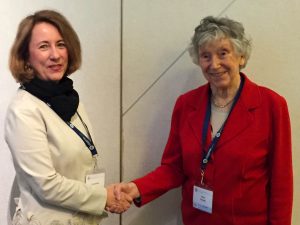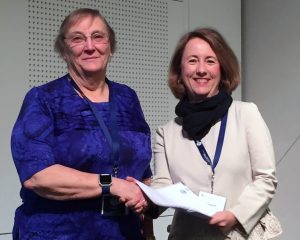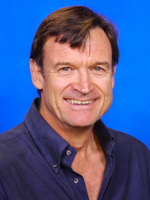AADDM News
Substantial mortality gap remains for people with intellectual disability compared to the general population
A recently published study by Trollor et al, 2017, (http://bmjopen.bmj.com/content/7/2/e013489) confirms that substantial health inequities remain for people with intellectual disability (ID). In a large population based cohort study in NSW that included 42 204 people with ID, median age of death of people with ID was 54 years, compared to 81 years in the general population, with 38% being due to potentially treatable conditions. Respiratory and neurological causes of death were particularly common, with the overall comparable mortality figure of 1.3.
This study is ground breaking in Australia given its size and that it systematically examines mortality in a large population of people with ID who use disability services. Although there are limitations to the study, the policy implications for health and disability services are undeniable. Whole of system responses are urgently required to address existing barriers to prevention, early detection and treatment of health conditions experienced by people with ID.
Please see the following 730 Report, aired on the ABC on February 7, 2017 – http://www.abc.net.au/news/2017-02-08/study-finds-intellectually-disabled-two-times-preventable-death/8248772, and NSW Council for Intellectual Disability to read more about their efforts to improve the health of people with ID (http://www.nswcid.org.au/).
Presentations and Resources from the Global Partnerships in Intellectual Disability Health Symposium – August 22, 2016
Thank you to those who attended the Sydney Symposium – Global Partnerships in Intellectual Disability Health (a collaborative effort of the ACI ID Health Network and NSW ADHC).
The presentations can be found here. Other resources can be found on the ACI website.
Dr Helen Beange Awarded the Inaugural Honorary Life Membership
 Dr Helen Beange AM has been awarded the inaugural Honorary Life Membership AADDM in 2016 as a retired member who continues to actively support the goals and aims of AADDM.
Dr Helen Beange AM has been awarded the inaugural Honorary Life Membership AADDM in 2016 as a retired member who continues to actively support the goals and aims of AADDM.
Helen was a pioneer in the healthcare of people with intellectual and developmental disability (ID) and continues to highlight significant health disparities. She demonstrated that the health of people with ID was poorer than the general community by undertaking population surveys that showed high rates of undiagnosed health conditions. Helen cofounded AADDM and Health SIRG, IASSID, 2 organisations dedicated to improving the health of people with ID.
Dr Margaret Kyrkou is the Winner of the Bob Davis Award in 2016
 Dr Margaret Kyrkou MBBS FRACGP PhD OAM was awarded the Bob Davis Award in 2016 for substantial contributions to the healthcare of people with intellectual disabilities. Margaret has dedicated her professional life to teaching, research, advocacy and providing specialised clinical care to people with intellectual and developmental disabilities.
Dr Margaret Kyrkou MBBS FRACGP PhD OAM was awarded the Bob Davis Award in 2016 for substantial contributions to the healthcare of people with intellectual disabilities. Margaret has dedicated her professional life to teaching, research, advocacy and providing specialised clinical care to people with intellectual and developmental disabilities.
Margaret’s research in the use of intranasal midazolam in prolonged seizures and in menstruation and puberty in young women with Down Syndrome has led to significant changes in clinical practice. She has delivered clinical services to rural South Australia, managed programs that provided support to students with significant disabilities within educational settings, developed standardised seizure management protocols through the use of intranasal midazolam and for the past 10 years worked in the Centre for Disability Health providing care to children and young adults with the most complex health needs and challenging behaviour not able to be managed elsewhere.
Margaret’s expertise in health care of children and adults with ID has led to teaching and other professional roles in Australia and internationally. For 20 years she has lectured at Flinders University, South Australia and has held an adjunct professorial post at Simon Fraser University Canada. Margaret has held many professional roles, participated in numerous committees as both parent and professional and delivered national and international conference presentations.
Margaret is an extremely worthy winner of the 2016 Bob Davis Award for substantial contributions to healthcare of people with intellectual disability in Australia.
For more information on the Bob Davis Award, please click here.
Global Partnerships in Intellectual Disability Health Symposium – August 22, 2016
With so many international experts and leaders in the field of Developmental / Intellectual Disability in Australia for the IASSID Congress in Melbourne, we thought we would invite some to Sydney before they return home for a Symposium.
This symposium is intended for researchers, clinical practitioners, policy writers and managers and will also benefit those working with people with intellectual disability in the community.
Presenters include:
- Prof. Helene Oullette Kuntz
- Prof. Ted Brown
- Dr Laurence Taggart
Find out more here.
2016 IASSIDD World Congress – August 15-19, 2016
AADDM encourages its members to attend the 2016 IASSIDD World Congress in Melbourne 15-19 August which will be an excellent opportunity to hear from local and international colleagues about leading issues in research, policy and practice in intellectual disability.

For more information, please visit the IASSIDD Conference website.
Professor Nick Lennox is the Winner of the Bob Davis Award in 2015
 Professor Nick Lennox is the inaugural winner of the Bob Davis Award. Nick has made outstanding contributions over many years to prevent and treat health problems in people with intellectual or developmental disability. In 1997, Nick established what become the Queensland Centre for Intellectual and Developmental Disability and continues to deliver clinical services, an enviable research agenda, and advocate at all levels of government and the community sectors.
Professor Nick Lennox is the inaugural winner of the Bob Davis Award. Nick has made outstanding contributions over many years to prevent and treat health problems in people with intellectual or developmental disability. In 1997, Nick established what become the Queensland Centre for Intellectual and Developmental Disability and continues to deliver clinical services, an enviable research agenda, and advocate at all levels of government and the community sectors.
A major research contribution of Nick’s has been establishing the evidence base for the CHAP, a tool to assist detection of health problems in primary health care. His ef efforts have led to international recognition of the CHAP as an effective tool to improve health outcomes in people with ID. He continues to work to develop major educational modules (MOOC), harnessing technology to deliver education about the health of people with ID to a global audience.
Nick served as President, AADDM for 8 years and was instrumental in establishing this national professional organisation in Australia. As President, AADDM, he was tireless in his efforts to ensure the health needs of people with IDD were included in national strategic action plans. Nick is a widely admired person, deeply respected for his honourable, principled and compassionate approach.
For more information on the Bob Davis Award, please click here.
